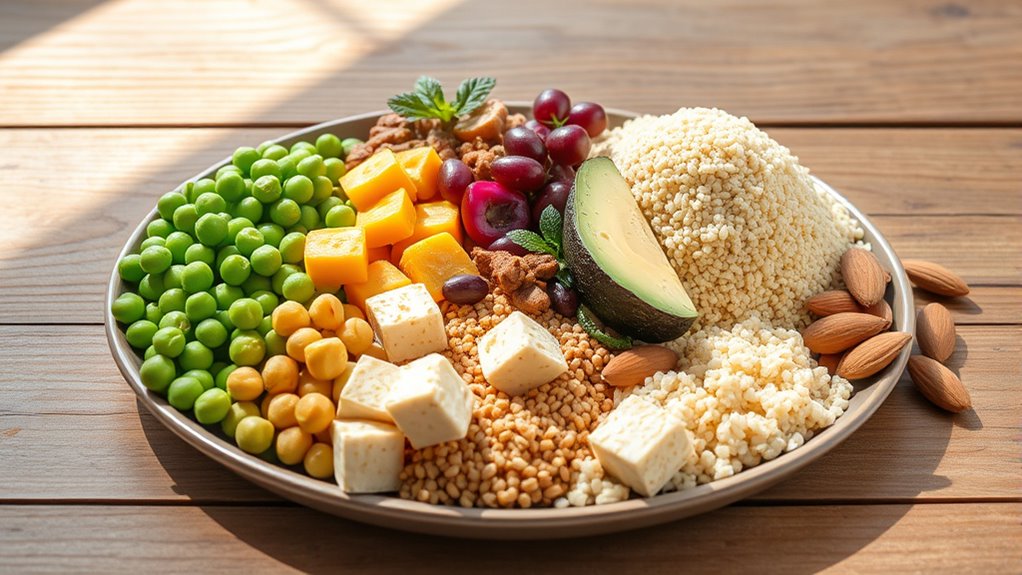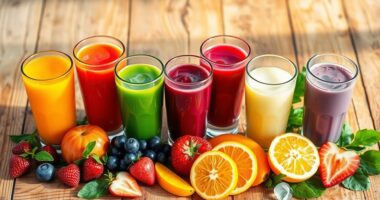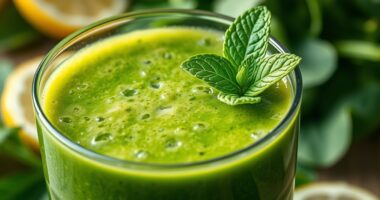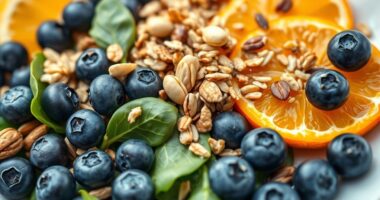To succeed with intermittent fasting on a vegan diet, focus on plant-based protein sources like lentils, chickpeas, quinoa, tofu, tempeh, edamame, and chia seeds. These help maintain your energy, support muscle health, and stabilize blood sugar levels during your 16:8 window. Combining these foods with healthy fats and complex carbs guarantees balanced nutrition. Keep exploring to discover more tips on optimizing your vegan fasting routine.
Key Takeaways
- Incorporate plant-based proteins like lentils, chickpeas, tofu, tempeh, and edamame during your 8-hour eating window.
- Combine proteins with healthy fats and complex carbs to sustain energy and stabilize blood sugar levels.
- Use complete protein sources such as quinoa and chia seeds to ensure all essential amino acids are covered.
- Vary your protein sources to prevent nutritional gaps and support muscle preservation during fasting.
- Prioritize nutrient-dense, easy-to-prepare meals that include plant proteins, fiber, and vital micronutrients for optimal health.
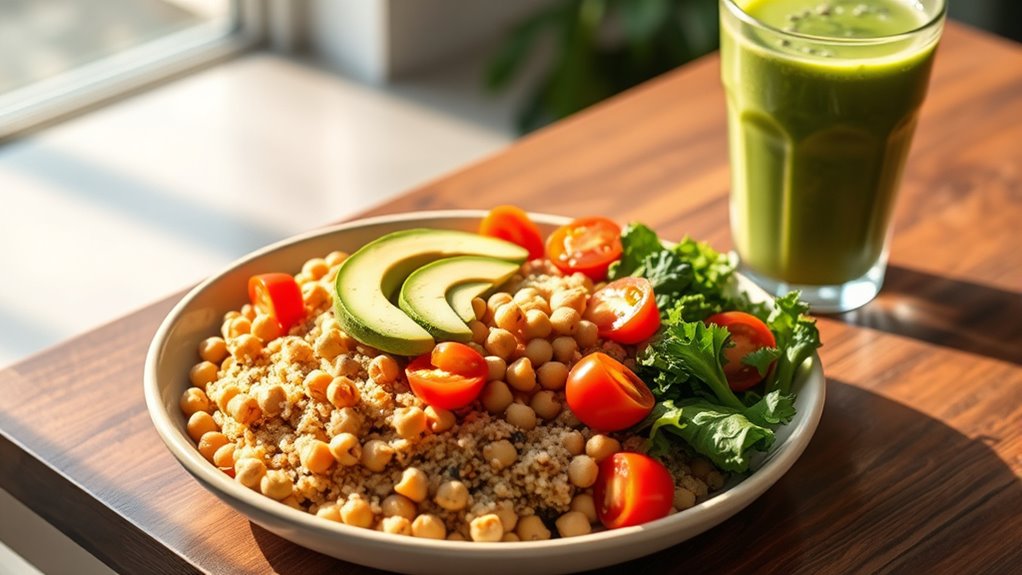
Combining a vegan diet with intermittent fasting can be an effective approach to improve your health and support sustainable living. When you follow a 16:8 fasting schedule, you have an 8-hour window to consume all your nutrients, which makes choosing the right plant-based proteins essential for maintaining energy, muscle mass, and overall wellness. Incorporating quality plant-based proteins ensures you meet your daily protein needs without relying on animal products, and it enhances the fasting benefits by stabilizing blood sugar levels and reducing hunger during your fasting period.
Focusing on plant-based proteins like lentils, chickpeas, quinoa, tofu, tempeh, and edamame is key. These foods provide substantial amounts of protein and are rich in fiber, vitamins, and minerals, helping you stay full longer and supporting digestion. Lentils and chickpeas are versatile and can be added to salads, soups, or made into spreads, making it easier to include them within your eating window. Quinoa stands out because it’s a complete protein, containing all nine essential amino acids, which is especially beneficial on a vegan diet. Incorporating tofu and tempeh provides high-quality protein that can be stir-fried, baked, or grilled, offering variety and satisfying textures.
Plant-based proteins like lentils, chickpeas, quinoa, tofu, and tempeh support health and variety in vegan fasting routines.
During your eating window, prioritize these plant-based proteins to maximize fasting benefits. Consuming enough protein helps preserve muscle mass, promotes satiety, and stabilizes blood sugar, which prevents energy crashes and hunger pangs during your fasting hours. Combining these proteins with healthy fats and complex carbohydrates will give you sustained energy and support your overall health goals. For example, a hearty quinoa and vegetable stir-fry with tofu or a chickpea salad with avocado can be nourishing and easy to prepare.
It’s important to balance your meals with a variety of plant-based proteins to ensure you get all essential amino acids. While some plant proteins are incomplete on their own, eating a diverse mix throughout your eating window guarantees you meet your nutritional needs. This variety not only supports muscle maintenance but also optimizes the fasting benefits by keeping your body well-nourished and resilient. Additionally, incorporating growing and harvesting chia seeds into your diet can boost your intake of Omega-3 fatty acids and fiber, further supporting your health and fasting goals. Staying consistent with your intake and choosing nutrient-dense foods also helps cultivate a sustainable vegan fasting routine, making it easier to stick with your health commitments long-term.
Frequently Asked Questions
Can Vegans Meet Protein Needs During 16:8 Fasting?
You can absolutely meet your protein needs during 16:8 fasting as a vegan. Focus on consuming diverse plant-based amino acids through foods like legumes, tofu, quinoa, and nuts. These sources support vegan protein absorption and make sure you get all essential amino acids. By planning your meals well within your eating window, you can maintain adequate protein intake and support your health without compromising your vegan lifestyle.
How to Prevent Muscle Loss While Fasting on a Vegan Diet?
Did you know that maintaining muscle mass is vital, as muscle loss can occur in as little as two weeks of fasting? To prevent muscle loss while fasting on a vegan diet, focus on muscle preservation by incorporating plant-based protein sources like lentils, tofu, and tempeh. Use effective fasting strategies like combining resistance training with adequate protein intake, ensuring your muscles stay strong and healthy during your fasting periods.
Are Vegan Protein Powders Effective During Intermittent Fasting?
Vegan protein powders can be effective during intermittent fasting, especially if you choose plant-based options with good absorption. They provide a convenient way to meet your protein needs without breaking your fast, as long as you consume them in moderation and without added sugars. Look for powders made from pea, rice, or hemp protein, which are easily absorbed and support muscle maintenance during your fasting window.
What Are Quick Vegan Protein Snacks for Eating Window?
Like a lightning bolt, quick vegan snack ideas can power your day. You can grab plant-based protein like hummus with veggie sticks, a handful of nuts, or a spoonful of peanut butter with banana. These snacks are easy to prepare and pack, keeping you energized during your eating window. Incorporate vegan snack ideas that focus on plant-based protein to support your fasting routine effortlessly and deliciously.
How Does Fasting Impact Nutrient Absorption From Plant-Based Sources?
Fasting can influence how you absorb nutrients from plant-based sources, mainly due to bioavailability challenges. When you fast, your digestive system gets a break, which might slow phytochemical absorption and nutrient uptake. However, with proper meal timing and food choices, you can maximize bioavailability, ensuring your body effectively absorbs essential nutrients. Focus on consuming nutrient-dense, well-processed plant foods during your eating window to support ideal absorption.
Conclusion
As you navigate the dance of intermittent fasting on a vegan diet, remember that your protein sources are the steady beats guiding your rhythm. Like a well-tuned orchestra, these plant-based options harmonize to fuel your journey, turning each meal into a nourishing melody. Embrace this symphony of flavors and nutrients, knowing that with mindful choices, you’re composing a vibrant, resilient life—where health blooms like a sunrise after a long night.

